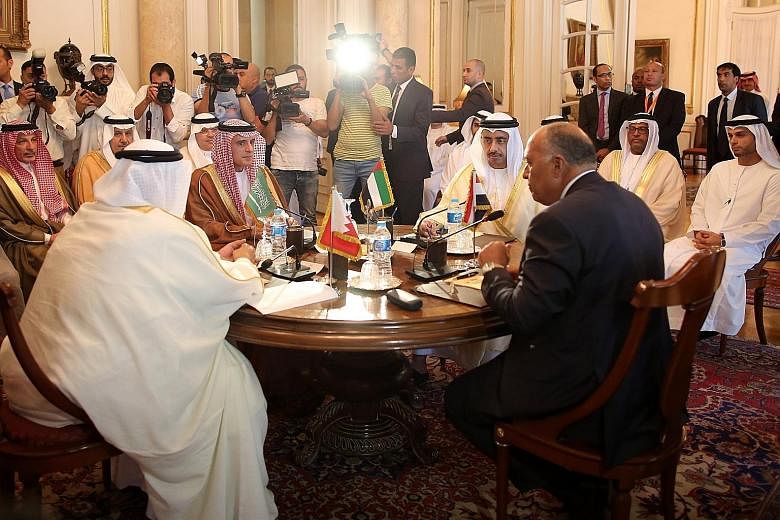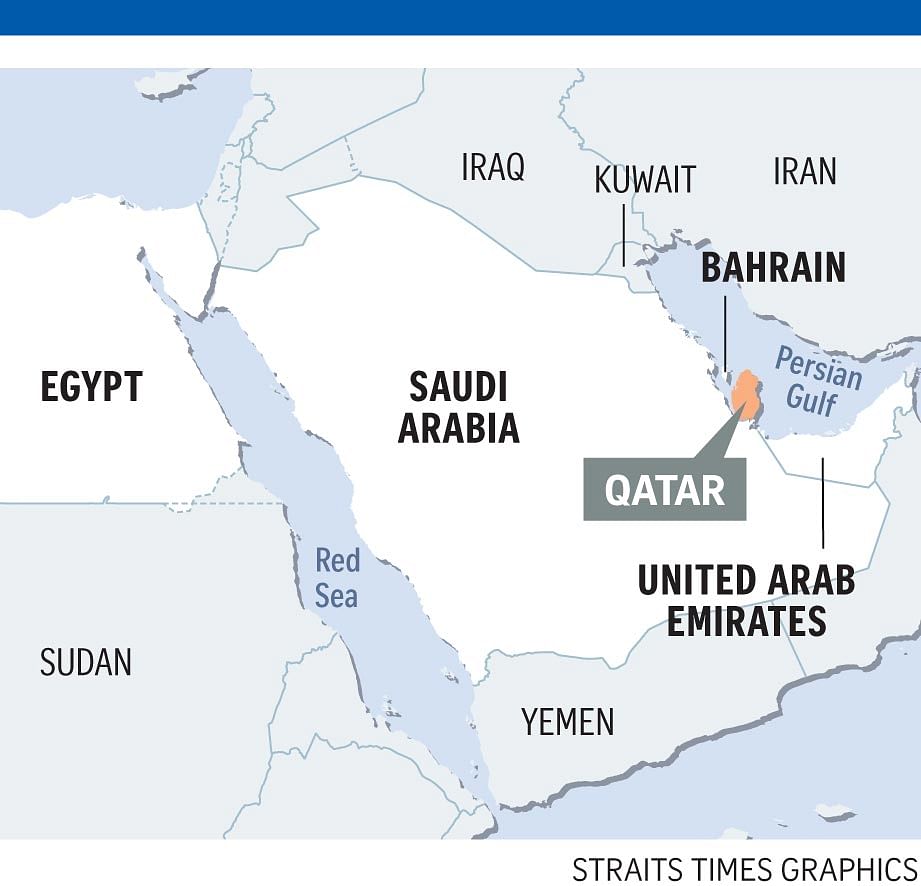CAIRO • Foreign ministers from the four Arab states leading the boycott of Qatar said the restrictions will remain but they did not announce new sanctions against the tiny Gulf nation.
The ministers of Egypt, Saudi Arabia, Bahrain and the United Arab Emirates said they "regret the negative response from Qatar" to a list of demands to end a diplomatic crisis, according to a statement read out by Egyptian Foreign Minister Sameh Shoukry yesterday after a meeting in Cairo.
Saudi Foreign Minister Adel Al-Jubeir said further steps against Qatar will be taken at the appropriate time and will be in line with international law.
Saudi Arabia and its allies have not said what steps they could take next, but there are fears of a wider embargo that would hurt the Qatari economy, with credit ratings agency Moody's announcing it was changing the emirate's outlook to negative from stable over the crisis.
The four Arab states have cut diplomatic and transport ties with Qatar, which they accuse of supporting terrorism and allying with regional foe Iran. Doha denies the charges.
The countries issued the 13-point list of demands on June 22, giving Qatar 10 days to respond. The deadline was extended by 48 hours on Sunday at the request of Kuwait, which is mediating in the crisis, and Qatar handed in the response on Monday.
Earlier, Qatar's Foreign Minister accused the four Arab countries of "clear aggression" against his country.
Sheikh Mohammed bin Abdulrahman al-Thani said the charges cited by Saudi Arabia, Bahrain, the United Arab Emirates and Egypt "were clearly designed to create anti-Qatar sentiment in the West".
"Reading between the lines, the blockading countries were demanding that we have to surrender our sovereignty to end the siege, something which... Qatar will never do," he said.
"Qatar continues to call for dialogue despite the violation of international laws and regulations, despite the separation of 12,000 families, despite the siege that is a clear aggression and an insult to all international treaties, bodies and jurisdictions," Sheikh Mohammed told a meeting at London's Chatham House think-tank.
Amid the Cairo meeting, US President Donald Trump yesterday spoke with Egyptian President Abdel Fattah al-Sisi about the Qatar crisis, calling for talks to resolve the dispute, said the White House.
The rift between Qatar and its neighbours has aroused deep concern among Western allies who see the region's ruling dynasties as key partners in energy and defence. Qatar has invested heavily in infrastructure projects in Western states and maintains close collaboration with the US over the conflict in Syria.
German Foreign Minister Sigmar Gabriel, on a tour of Gulf countries, said he was cautiously optimistic that the feuding countries would reach a solution once they met for talks. "But it is also possible that it will continue to be difficult for some days," he told reporters in Kuwait, where he met the Gulf state's ruler who is mediating in the crisis. He said Kuwait's mediation, backed by the US, had already achieved a lot.
Qatar faces further isolation and possible expulsion from the Gulf Cooperation Council (GCC), a regional economic and security cooperation body founded in 1981, if its response to the demands fails to satisfy the Arab states.
The Dubai-based Al-Bayan newspaper said in an editorial that all indications suggested Qatar had "belittled joint Gulf action and the Arab bloc".
"Doha chose to enter into a dark tunnel...We are today at a new situation after the Qatari rejection, and it is a rejection that will not pass without a price, and Qatar alone bears responsibility for this reaction."
Qatar has made clear that, while seeking settlement, it is preparing for a more protracted dispute. Doha announced on Tuesday it planned to raise liquefied natural gas production capacity by 30 per cent in the next five years.
Qatar's relatively limited trade ties with other Gulf states - largely food and construction exports - could also soften the effects of extended regional isolation.
The Arab countries have demanded that Qatar curtail its support for the Muslim Brotherhood, shut down the pan-Arab Al Jazeera TV channel, close down a Turkish military base and downgrade its ties with regional arch rival Iran.
Qatari officials have said they are unwilling to compromise on issues they regard as impinging on Doha's sovereignty.
REUTERS, AGENCE FRANCE-PRESSE
SEE EDITORIAL & OPINION:


